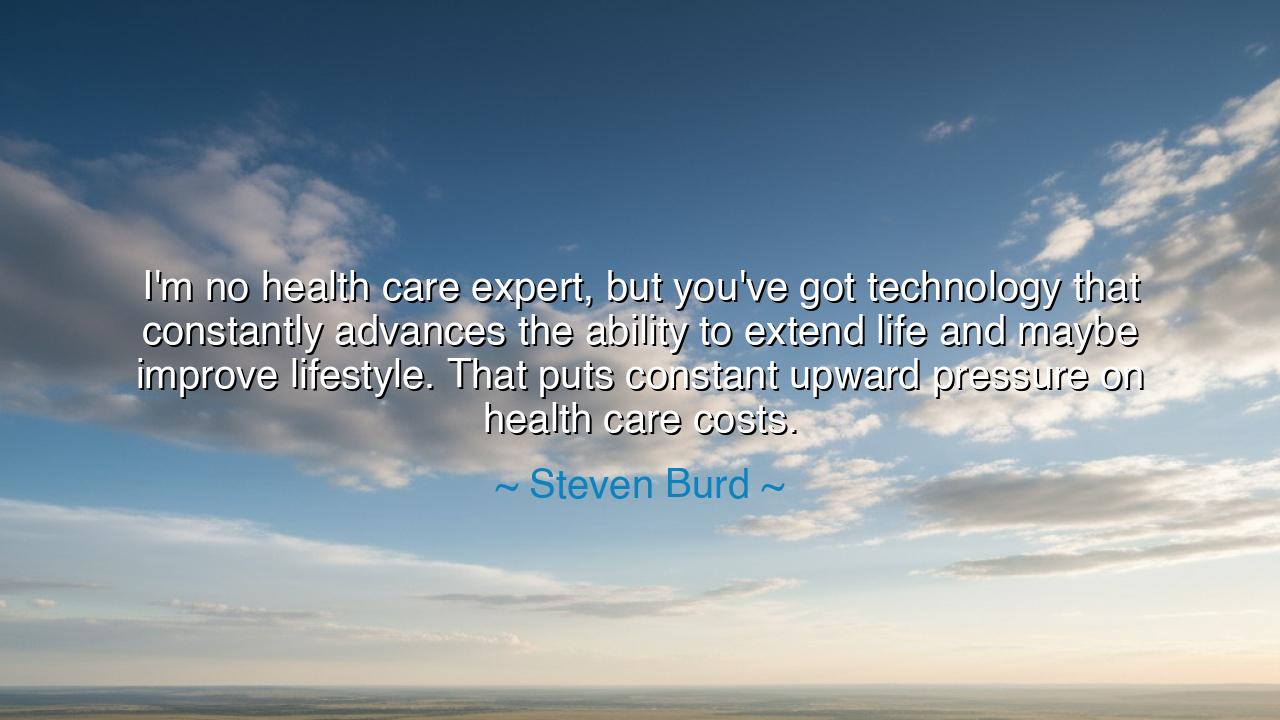
I'm no health care expert, but you've got technology that
I'm no health care expert, but you've got technology that constantly advances the ability to extend life and maybe improve lifestyle. That puts constant upward pressure on health care costs.






In an age where men strive to conquer time itself, Steven Burd spoke words that carry the weight of foresight and humility: “I’m no health care expert, but you’ve got technology that constantly advances the ability to extend life and maybe improve lifestyle. That puts constant upward pressure on health care costs.” Within this reflection lies not only an observation about economies and machines, but a meditation on the very nature of progress—how the gifts of invention, if untempered by wisdom, may burden the very souls they were meant to free.
Burd’s words remind us that every advance in technology comes with a shadow. The ancients once said that Prometheus, in stealing fire from the gods, gave light to mankind—but also suffering, for the flame that warms can also burn. So it is with our modern marvels: each new device that can extend life beyond its natural bounds brings joy to some and worry to all. The heart that beats through wires, the lungs that draw air through machines, the medicines that stave off death—all are triumphs of the human spirit, yet each adds a weight to the cost of living, both in coin and in conscience.
Consider the tale of Alexis Carrel, the Nobel Prize–winning surgeon who dreamed of eternal life. He preserved the heart tissue of a chicken in his laboratory, nurturing it for decades, believing it might live forever. Yet while the cells thrived, the man himself grew old and passed away. His experiment stood as a symbol: life may be prolonged, but not freed from the order of nature. In the same way, our pursuit of medical perfection often blinds us to its price. Every miracle demands maintenance, every cure demands a cost, and the system groans under the weight of its own generosity.
Burd’s insight, humble yet profound, speaks to the tension between progress and prudence. The power to heal is holy, but when guided only by ambition, it risks becoming a marketplace rather than a ministry. The more technology we create to mend the body, the more society must labor to afford it. And so the paradox grows: we live longer, yet pay more dearly for the privilege. In the quiet corners of hospitals and homes, one can almost hear the question whispered—have we made health a right, or a luxury?
Yet his words do not condemn progress; they call for balance. In the days of old, the great physician Hippocrates warned that medicine must serve nature, not defy it. The healer’s duty was to assist the body’s wisdom, not to force its rebellion against time. Burd echoes this ancient truth in modern form: that our innovations must serve humanity’s well-being, not enslave it beneath the rising cost of its own miracles. True healing must join hands with humility, ensuring that compassion grows as swiftly as technology.
Let the listener understand this lesson: not all that can be done should be done. The wise man does not chase eternity through machines, but seeks harmony between science and soul. We must learn to ask, “What is enough?”—for endless pursuit of more may rob us of the peace we seek. When technology becomes our idol, we trade simplicity for suffering, and our healing becomes a burden disguised as progress.
Therefore, live as one who honors both innovation and restraint. Celebrate the wonders that preserve life, but question the systems that turn healing into profit. Support technologies that serve all, not only the wealthy; embrace lifestyles that prevent illness rather than merely prolong it. Remember that the true measure of a society’s health is not how long its people live, but how deeply they live in kindness, gratitude, and wisdom.
For as Steven Burd reminds us, the march of technology will not cease—but it is we, not the machines, who must choose the direction of its steps. Let our progress be guided not by greed or fear of death, but by reverence for life itself. Then, perhaps, the rising tide of cost will give way to the rising light of understanding—and we will heal, not just our bodies, but our world.






AAdministratorAdministrator
Welcome, honored guests. Please leave a comment, we will respond soon